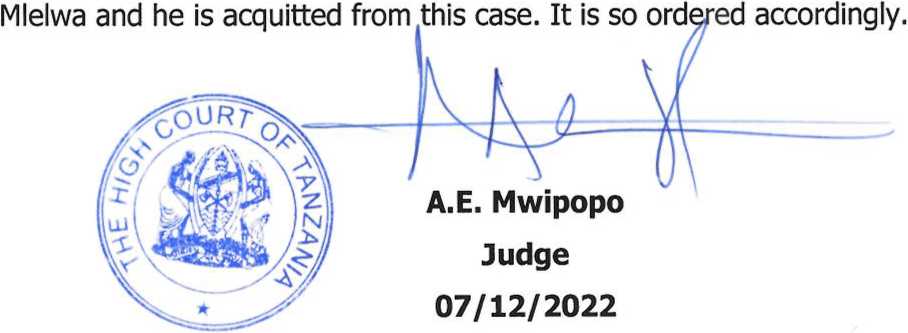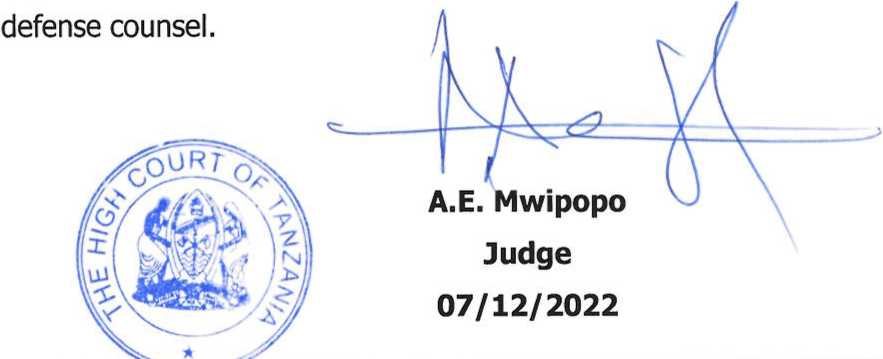IN THE HIGH COURT OF THE UNITED REPUBLIC OF TANZANIA
THE DISTRICT REGISTRY OF IRINGA
AT NJOMBE
CRIMINAL SESSIONS CASE NO. 09 OF 2020
THE REPUBLIC
VERSUS
STEFANO VICTOR! ©• MLELWA
RULING
(IN TERMSOF SECTION 293 OF THE CRIMINAL PROCEDURE ACT, CAP. 20, R.E20I9)
Date of Last Order: 06.12.2022
Date of Ruling: 07.12.2022
A.E. Mwipopo, J.
Stefano Victori @ Mlelwa was charged before this Court for the offence of murder contrary to section 196 and 197 of the Penal Code, Cap. 16, R.E, 2002. It was alleged that on the 22nd day of March, 2018 at Itulahumba Village within Wanging'ombe District in Njombe Region the accused person murdered one Tumaini Msule. The accused pleaded not guilty to the offence and the Republic summoned 2 witnesses and produced 3 exhibits to prove its case.
Briefly, the evidence adduced by prosecution witnesses proved that the deceased person namely Tumaini Msule is dead and her death was not natural, The deceased body had two penetrating wounds in the head. Dr. Yusta Nziku - PW1 conducted post mortem examination of the deceased body on 23.03.2018 at St. Joseph Hospital at Ikelu. PW1 said in her testimony that the deceased cause of death is head injury. The report on post mortem examination - Exhibit P2 reveals in its summary that the deceased body had two holes in the frontal head on the right side which caused excessive bleeding. This evidence prove without doubt that the deceased injury which is the cause of her death was not a natural one. She was killed.
The next question is who is responsible for the deceased death. The only prosecution witness whom is evidence is connecting the accused person with the death of the deceased is Police Officer with No. E. 5154 D/Sgt Timothy - PW2. PW2 testified that on 23/03/2018 the police received information that there is an incident which occurred at Itulahumba village and one women was shot by gun. He said that police visited the scene of crime were they were informed that the victim has already been taken to the hospital. Police inspected the scene of crime and they found blood drops in the ground, one spent cartridge and marks in the ground as if someone was dragged. PW2 picked the spent cartridge as exhibit and drew sketch map of the scene of crime - Exhibit Pl. Later on he got information that the victim is dead.
PW2 testified further that while investigating the incident, on 23.05.2018 he got information that some suspects were arrested by Police at Makambako with a gun. PW2 went to Makambako Police Station as there was possibility for the suspects arrested to be responsible for the death of the deceased at Itulahumba village. PW2 said he recorded the cautioned statement of accused person namely Stefano Victori Mlelwa - Exhibit P3 where the accused was confessing to participate in the killings of the deceased. The defense counsel objected tendering of the cautioned statement - Exhibit P3 on the ground that its recording was contrary to the procedures provided by the law. The Court in its ruling overruled the objection and admitted the cautioned statement as prosecution exhibit. PW2 testified further that when the accused person was arrested he was found in the possession of the gun and two bullets. That the accused person confessed that the deceased was shot by the bullet from the gun and it was Lupipa who shoot the deceased by using the gun. PW2 stated that the gun and the spent bullet cartridge were sent to Forensic Bureau for ballistic examination and the report revealed that the spent cartridge found at the scene of crime was fired by the gun found in the possession of the accused person. This was the end of PW2 testimony. After the testimony of PW2 the prosecutions closed their case.
From the evidence available in record, the prosecution case has sorely rested on the cautioned statement of the accused person. Under section 27 (1), (2) and (3) of the Evidence Act, Cap. 6 R.E. 2002, a confession voluntarily made to a police officer by a person accused of an offence may be proved as against that person. The onus of proving that the confession was voluntarily made by accused person lies on the prosecution. The confession shall be held to be involuntary if the court believes that it was induced by any threat, promise or other prejudice.
Where confession is retracted or repudiated a competent corroboration is required to enable confession to be acted upon. The principle was stated in the case of Mkubwa Said Omar vs. SMZ [1992] TLR 365, and Mbushuu @ Dominic Mnyaroje & Another vs. Republic [1995] TLR 97 at page 103. In the case of Hemed Abdallah vs. Republic [1995] TLR 172 (CA), it was held that:-
"Generaiiy, it is dangerous to act upon a repudiated or retracted confession unless it is corroborated in material particulars or unless the court, after full consideration of the circumstances, is satisfied that the confession must but be true."
Similar position was stated by the Court of Appeal in the case of Michael Luhiye vs. Republic [1994] TLR 181 (€A), where the Court held that:-
"It is always desirable to look for corroboration in support of a retracted confession before acting on it but a court may con vict on a retracted confession even without corroboration."
From above decisions, it is a settled principles of evidence that unless a retracted or repudiated confession is corroborated in material particulars, it is not prudent to base a conviction on its strength alone, otherwise the Court is satisfied that the confession is the truth.
The prosecution evidence in the present case is based solely on the confession of the accused person recorded by PW2. The defense side objected the tendering of the confession and their line of questions during cross examination shows that the accused person denies to have made at all the alleged confession before PW2. Thus, the confession made by the accused person required corroboration before this Court could rely on it.
In his testimony, PW2 testified that a spent cartridge was found at the scene of crime after the incident and the gun which was used to kill the deceased was seized in the possession of the accused person. That the said gun and spent cartridge was sent to Forensic Bureau for ballistic examination and the report revealed that the spent cartridge found in the scene of crime was fired by the gun which was found in the possession of the accused person. Unfortunately, neither the gun, spent cartilage nor the alleged ballistic report was tendered as prosecution exhibit to support the PW2's assertion. There is no reason given at all by the prosecution side and their witnesses for the reason for their failure to tender the said gun, certificate of seizure to prove that the gun was seized from accused possession, spent bullet cartridge and ballistic report as exhibit. The person who seized the gun from the accused person did not come to testify to court.
As the caution statement of the accused person was repudiated by the accused person, the Court finds that the same needed corroboration before the Court could rely on it in the conviction. However, there is no corroborating evidence at all available in the record and the failure of prosecution to bring ballistic examination report, spent cartilage found in the scene ofcrime, the gun which was found in possession of the accused person or the proof that the gun was found in the possession of the accused person raises doubt to the prosecution case.
I'm aware that no particular number of witnesses or exhibit is required in any particular case to prove any fact in terms of section 143 of the Evidence Act. The position has been stated in the case of Yohanis Msigwa vs. Republic [1990] T.L.R. 148. In the case of Gabriel Simon Mnyele vs. Republic, Criminal Appeal No, 437 of 2007, Court of Appeal of Tanzania at Dar Es Salaam, (unreported), it was held at page 18 of the judgment that:-
”... under section 143 of the Evidence Act (Cap 6-RE2002) no amount of witnesses is required to prove a fact - See Yohanis Msigwa vs. Republic, (1990) T.L.R. 148. But it is also the law (section 122 of the Evidence Act) that the court may draw adverse inference in certain circumstances against the prosecution for not calling certain witnesses without showing any sufficient reasons - See Aziz Abdalla vs. Republic (1991) T.L.R.71."
From above cited case, despite the facts that no particular number of witness is required to prove any offence, the prosecution failed to call witnesses to testify about how the accused person was arrested and how the gun alleged to be used in the murder incident was seized, the witness who took the gun to ballistic experts and the ballistic expert who examined the gun. Further, they failed to tender exhibits to prove that the gun was seized in accused possession and the report of ballistic examination showing that the said gun was the one which shoot the cartridge found in the scene of crime as It was the testimony of PW2. I made inference that failure of prosecution to bring those witnesses and tender those exhibits was for the purpose of denying the Court and the accused person to know the content of the evidence. The prosecution are hiding something and there is possibility that such evidence is against their case.
It is a settled principle of law that the burden of proof in criminal cases always rests on the shoulders of the prosecution side unless the law directs otherwise. It is not the duty of the accused person to prove his innocence. This is provided under section 114 (1) and (2) (a) (b) (c) of the Evidence Act, Cap. 6 R.E. 2022. The Court of Appeal in the case of Christian and Another ys. Republic [1992] TLR 302 held that the prosecution has a duty to prove the charge against the accused beyond all reasonable doubt and an accused ought to be convicted on the strength of the prosecution case. In another case of Magendo Paul and Another vs. Republic [1993] TLR 219, it was held by the Court of Appeal that:-
"For a case to be taken to have been proved beyond reasonable doubt its evidence must be strong against the accused person as to leave a remote possibility in his favour which can easily be dismissed."
With such kind of evidence in record, it is obvious that there is no sufficient evidence to warranty accused persons to defend himself. The evidence available is full of doubt and is not sufficient to prove that it was the accused person who has committed the offence of murder or any other offence of which, under the provisions of sections 300 to 309 of the Criminal Procedure Act, Cap. 20, R.E. 2002, he is liable to be convicted. Thus, I record a finding of not guilty against accused person namely Stefano Victori @

The ruling was delivered in open Court this 7th December, 2022, in the presence of State Attorneys for the Republic, the accused person and the

11 P a g e
